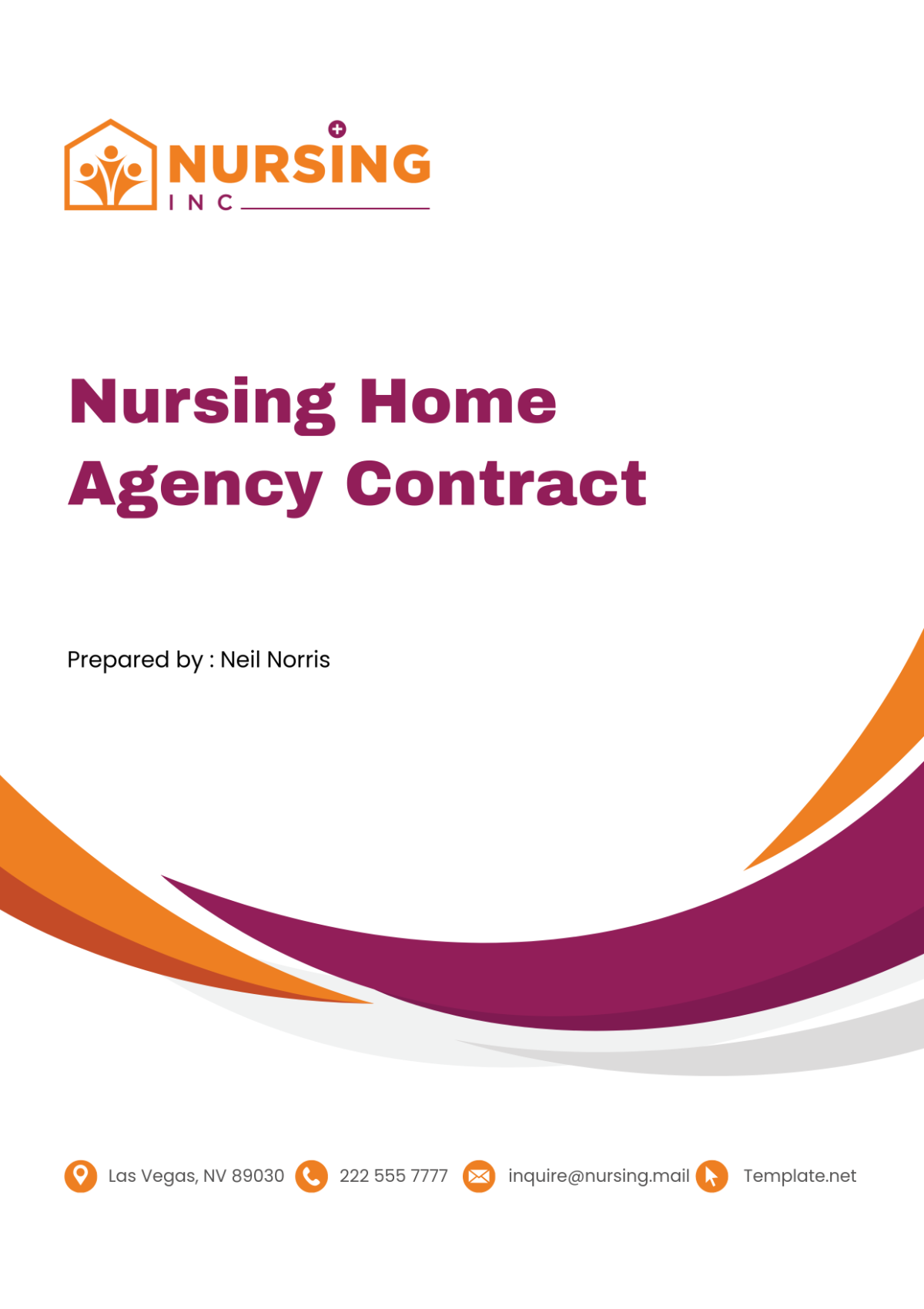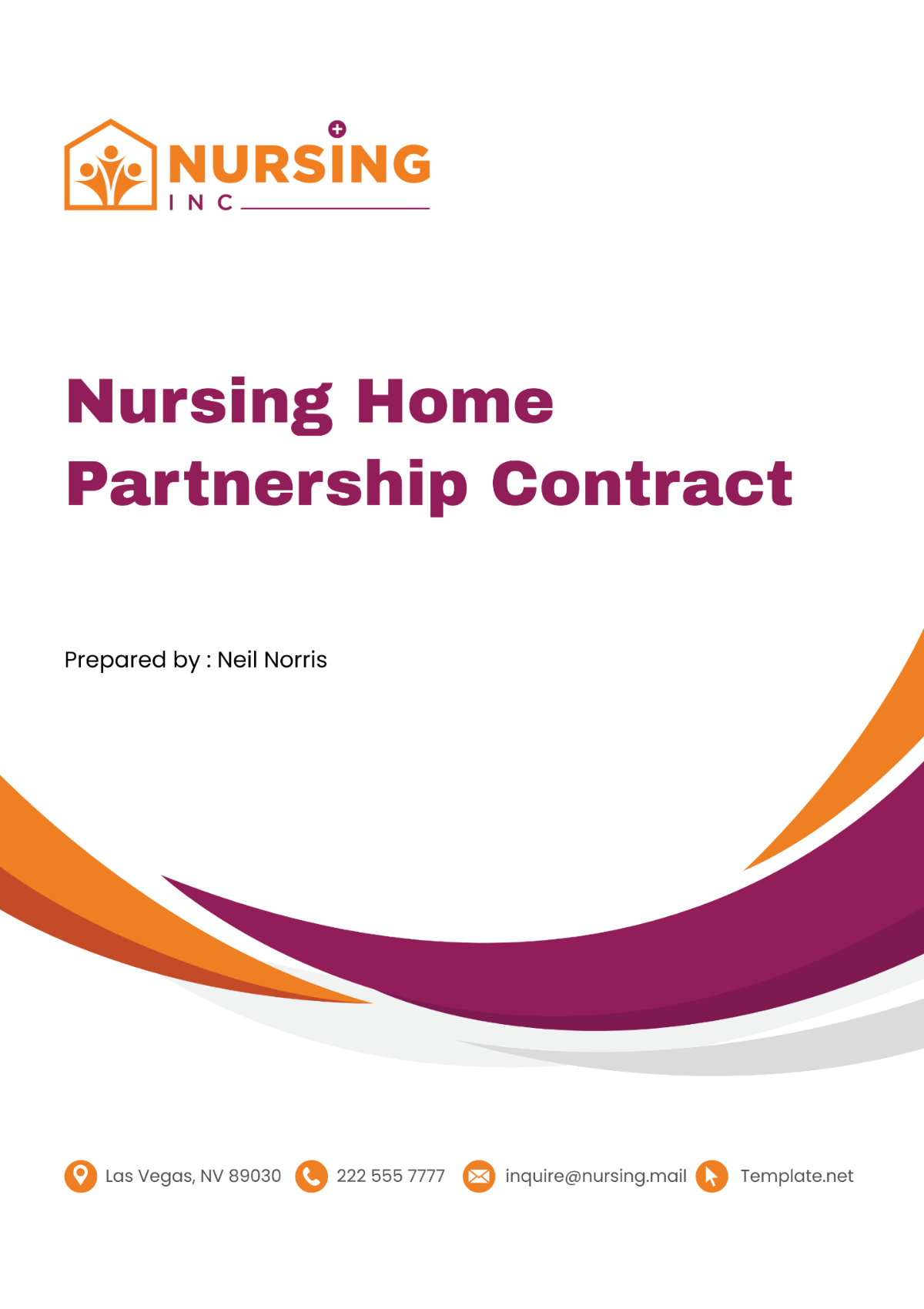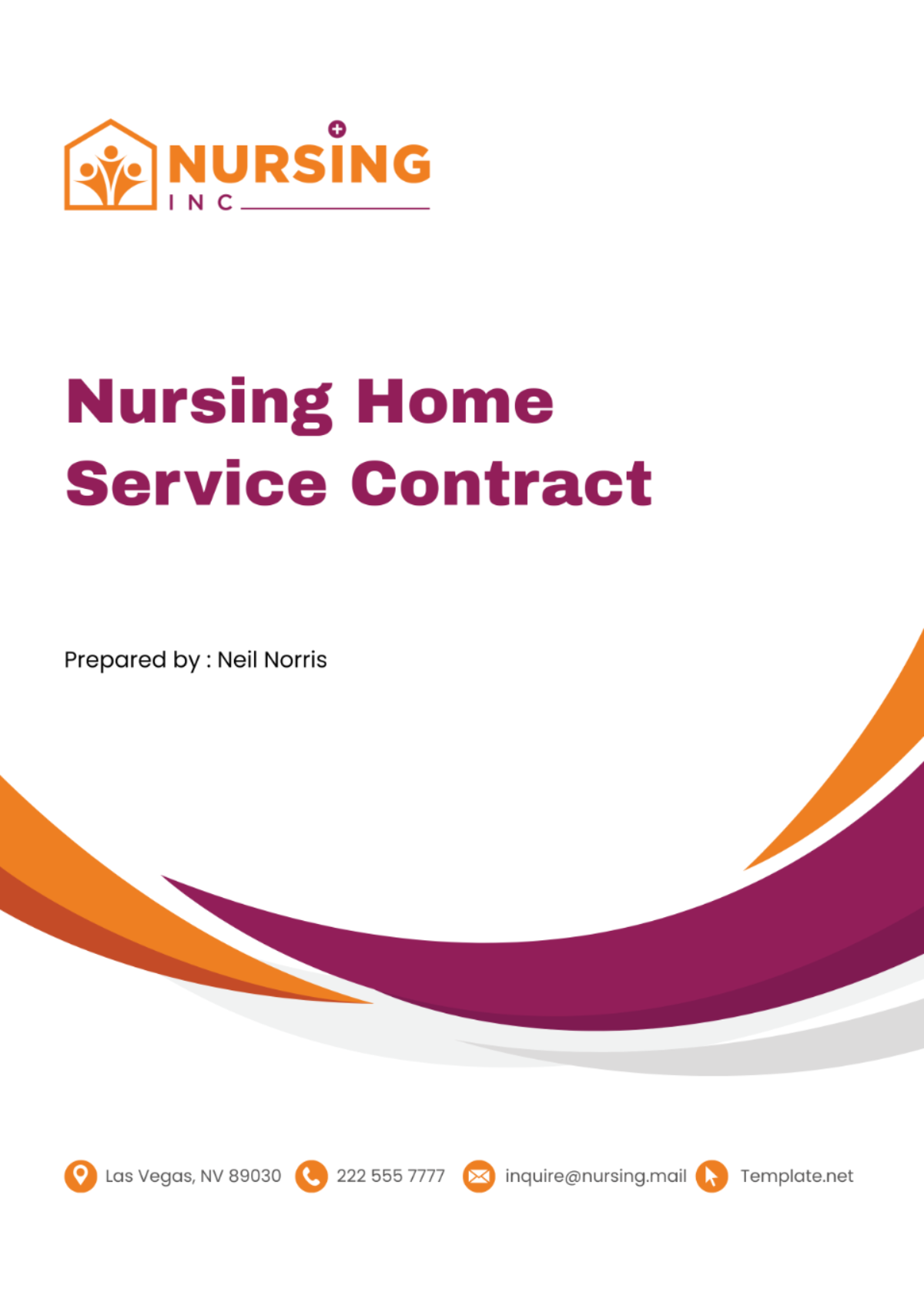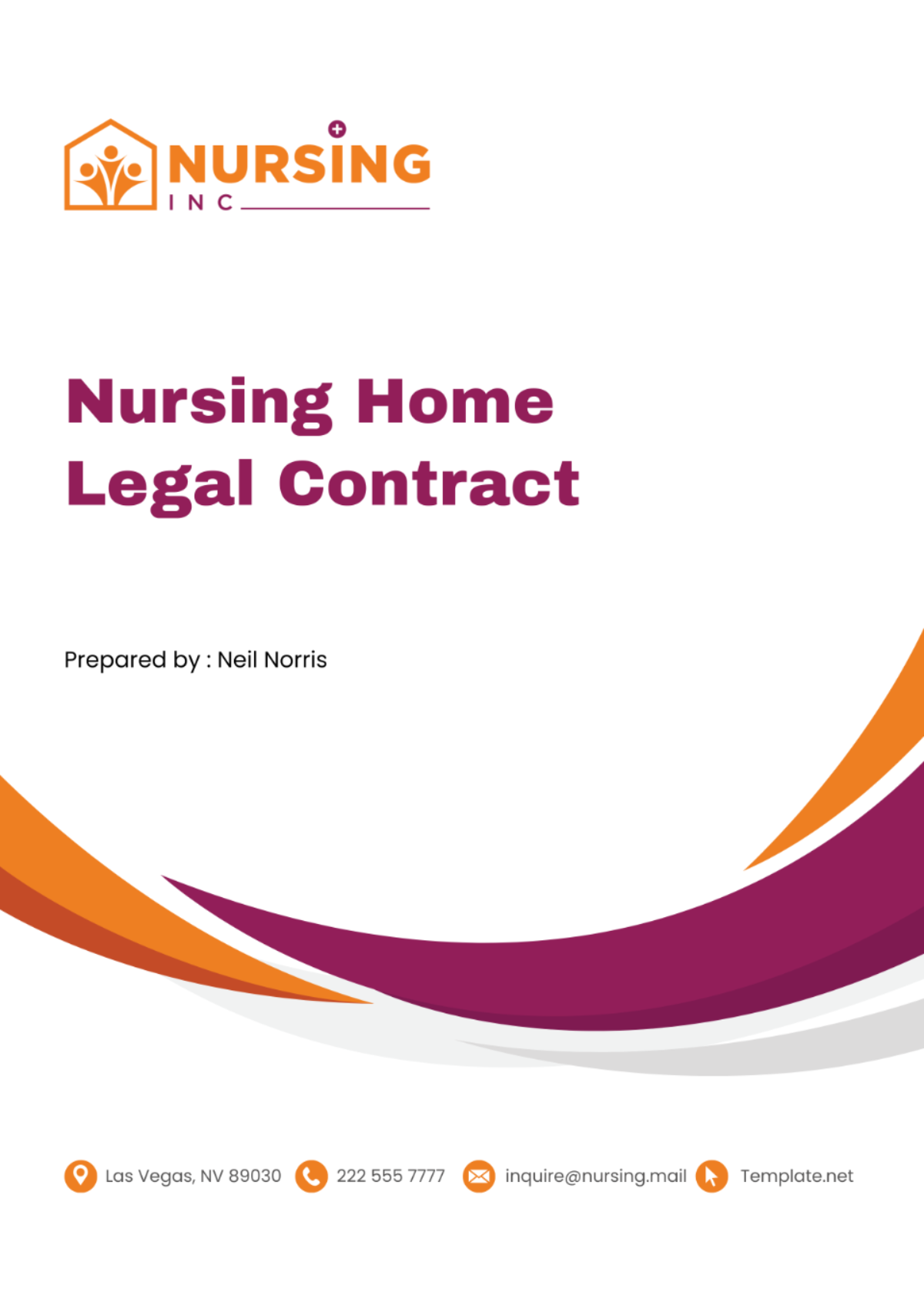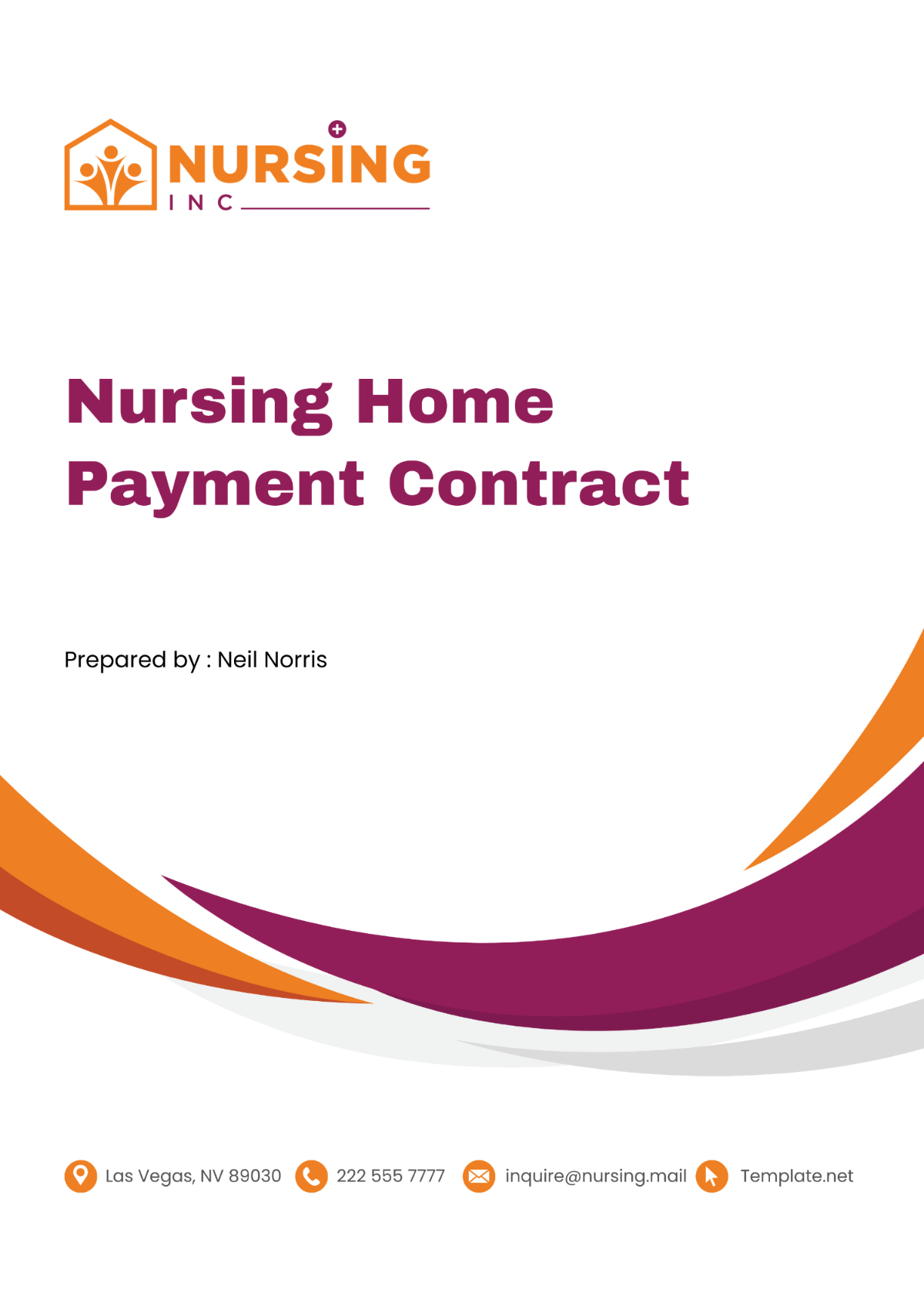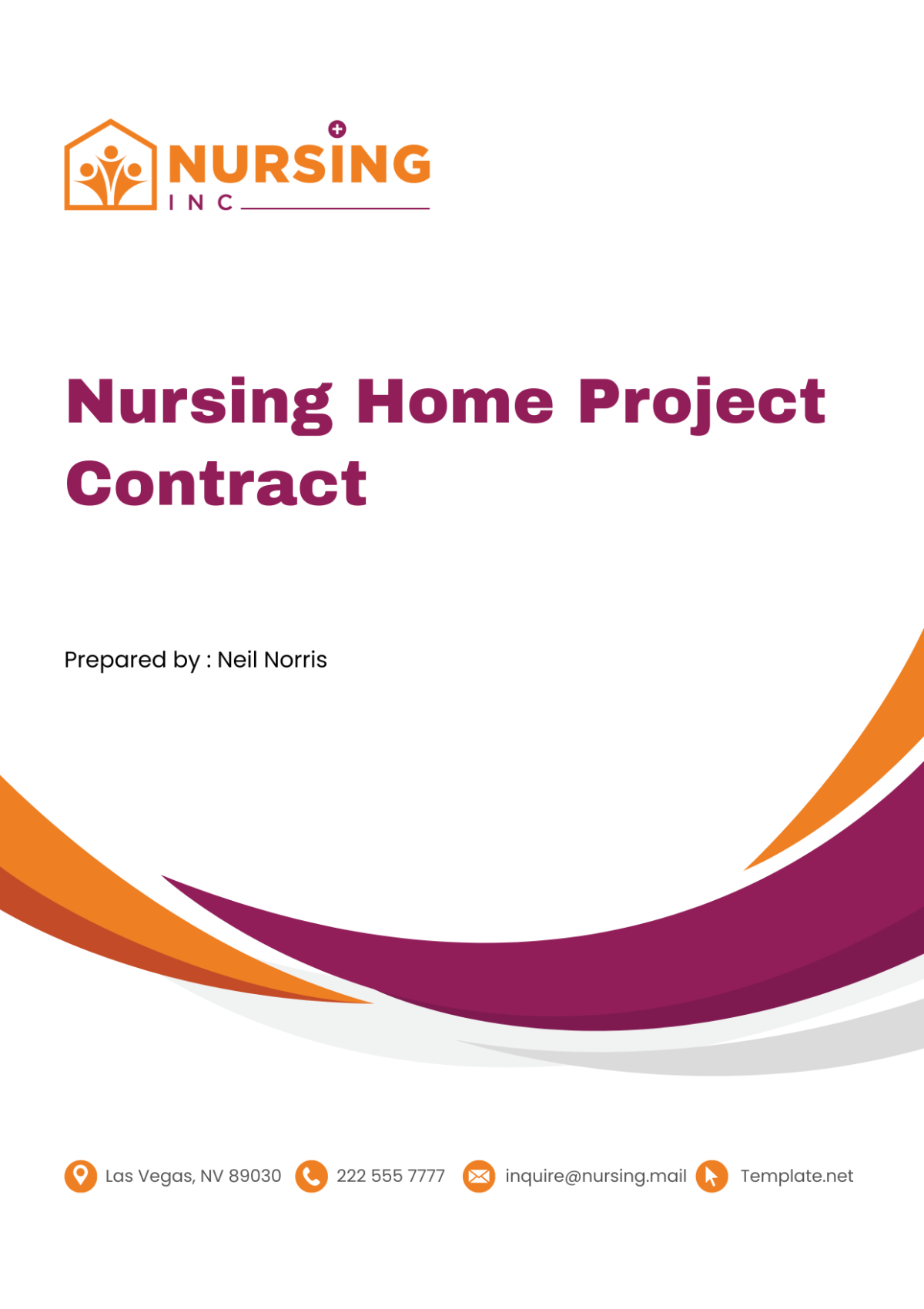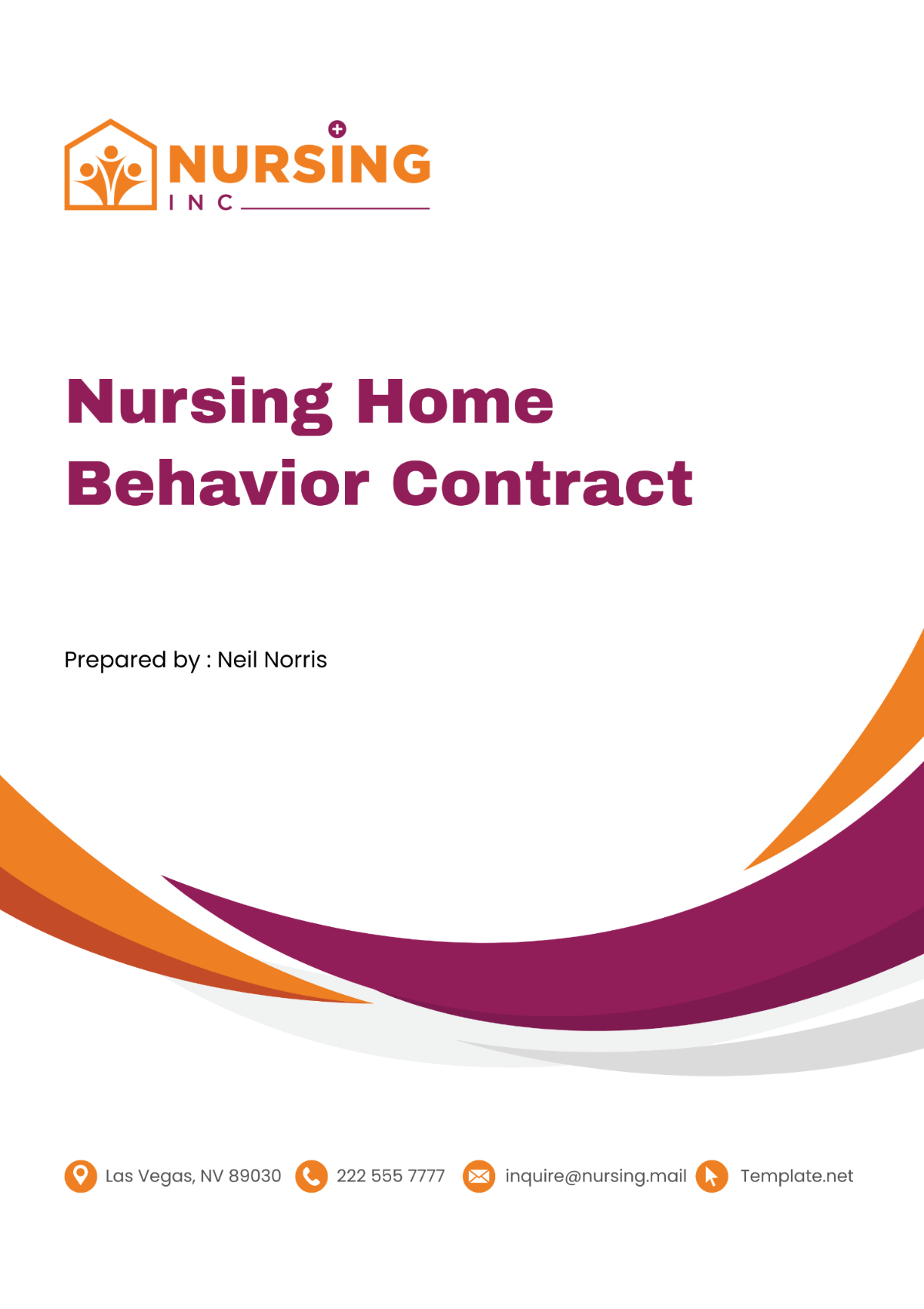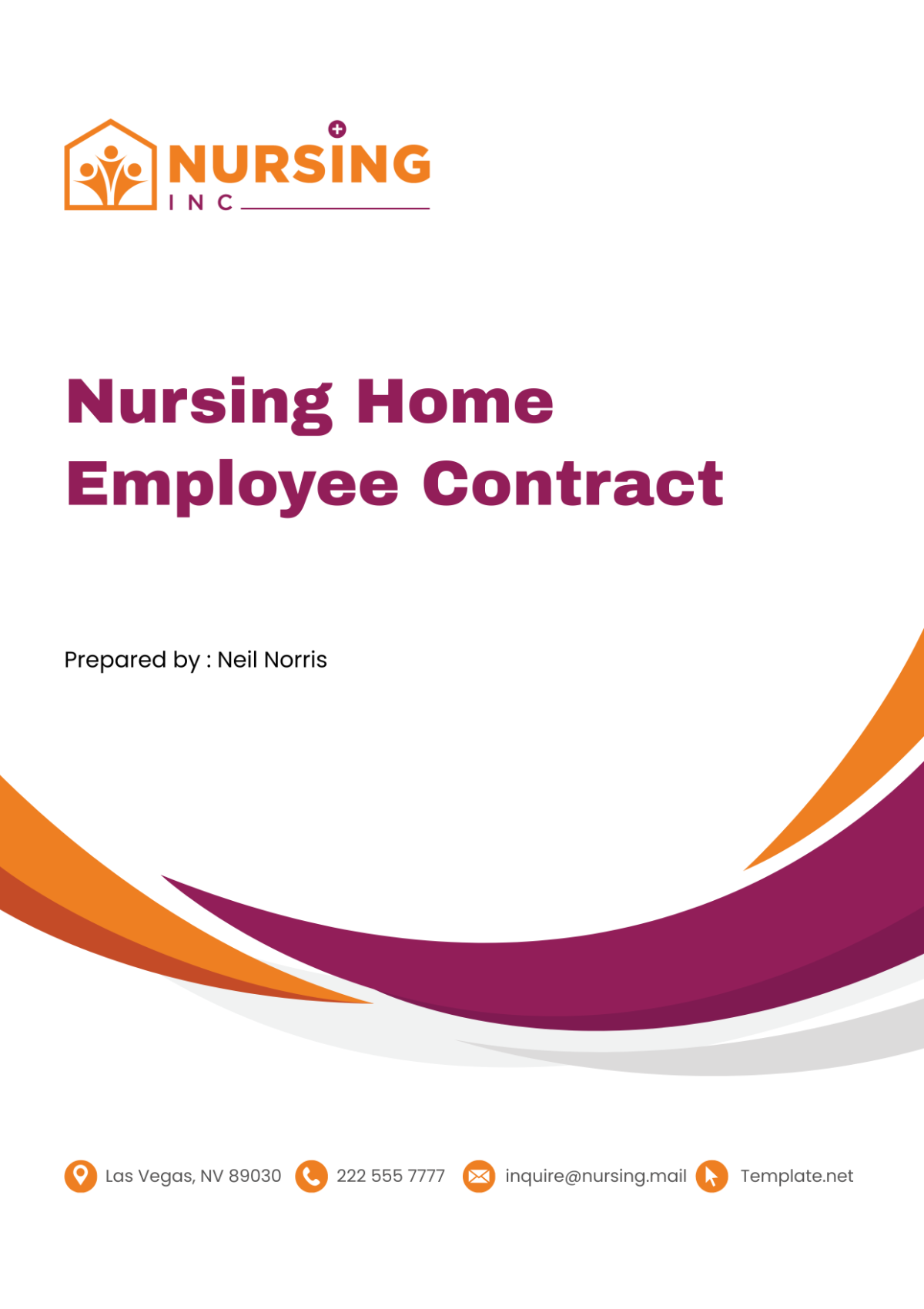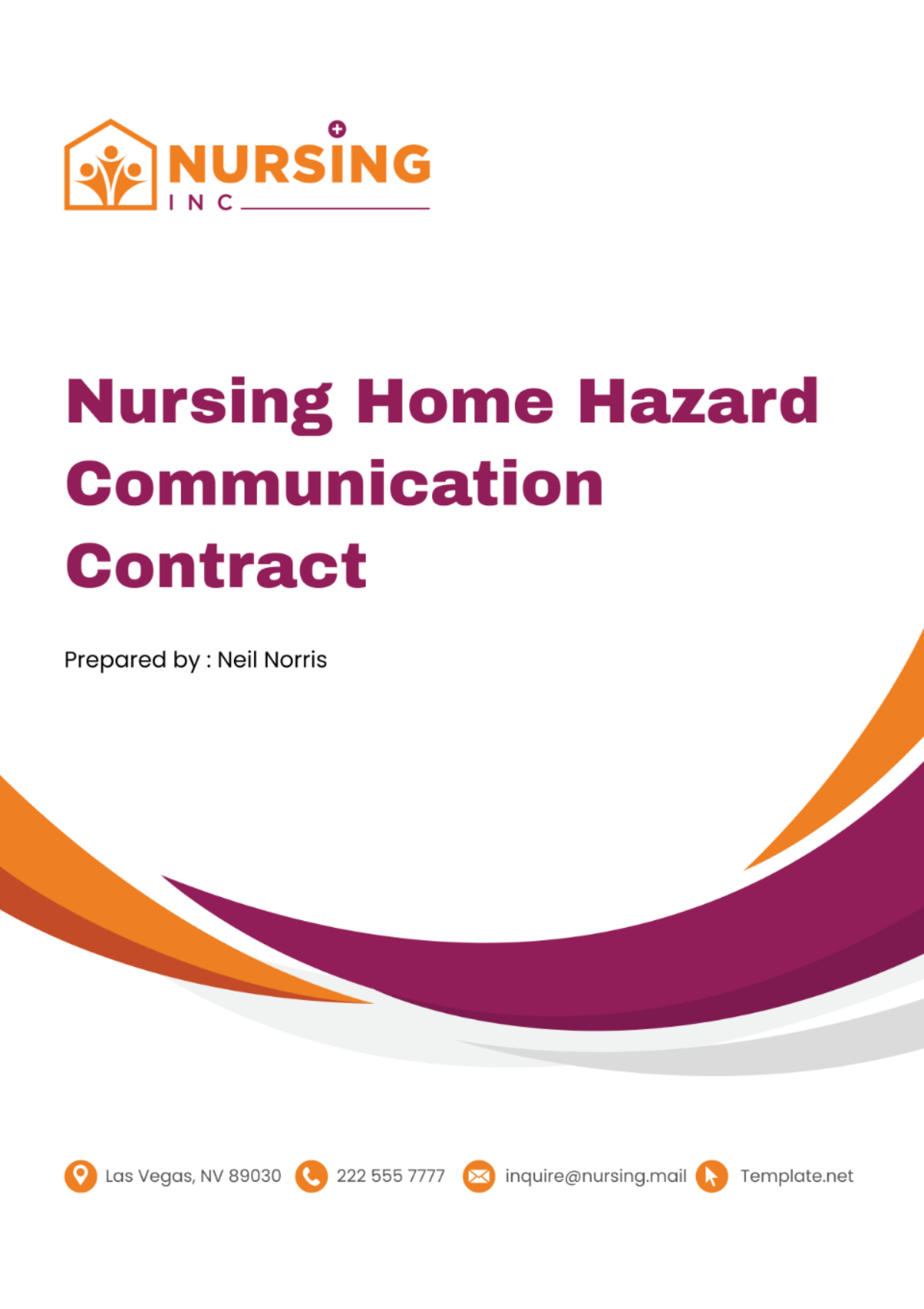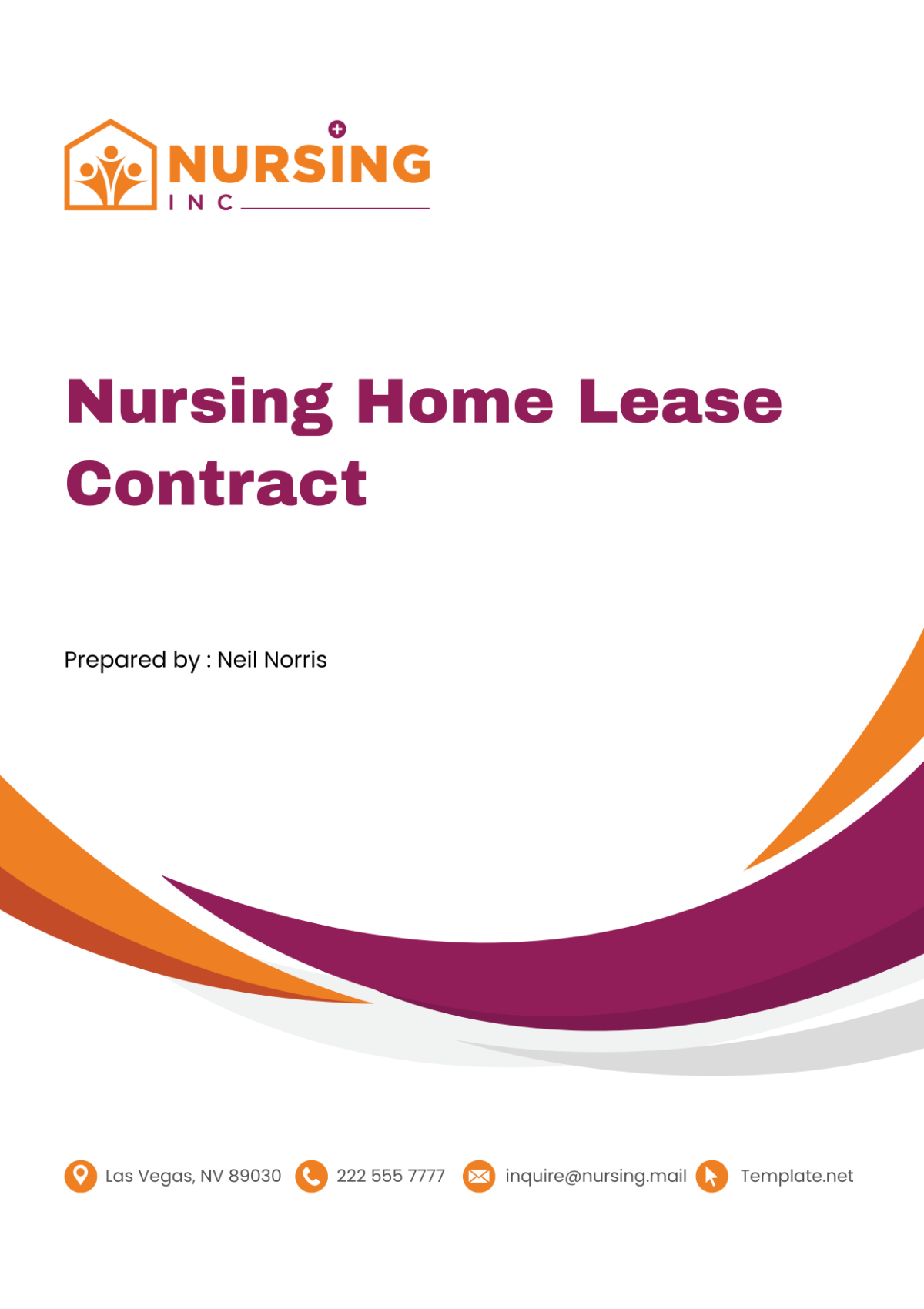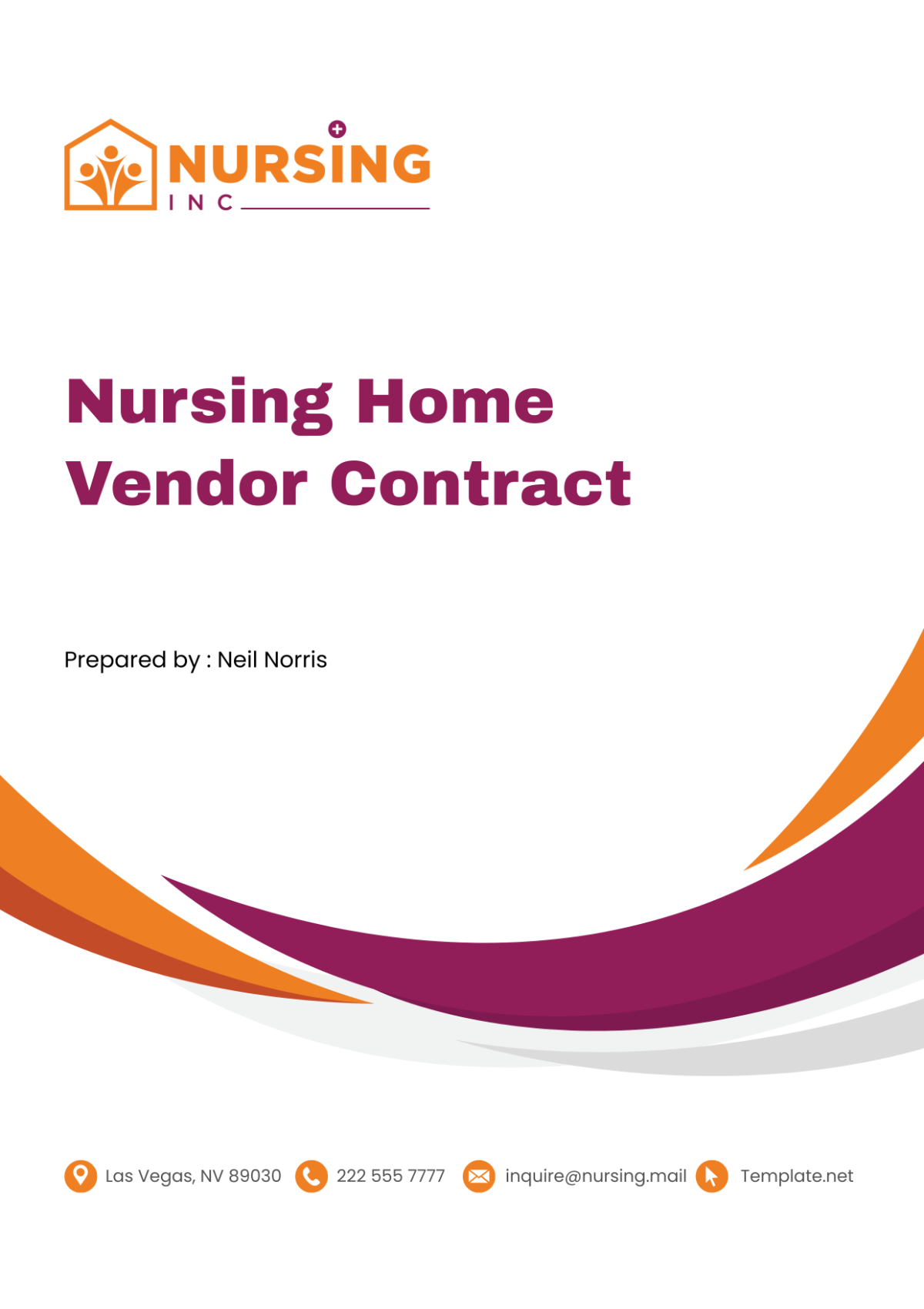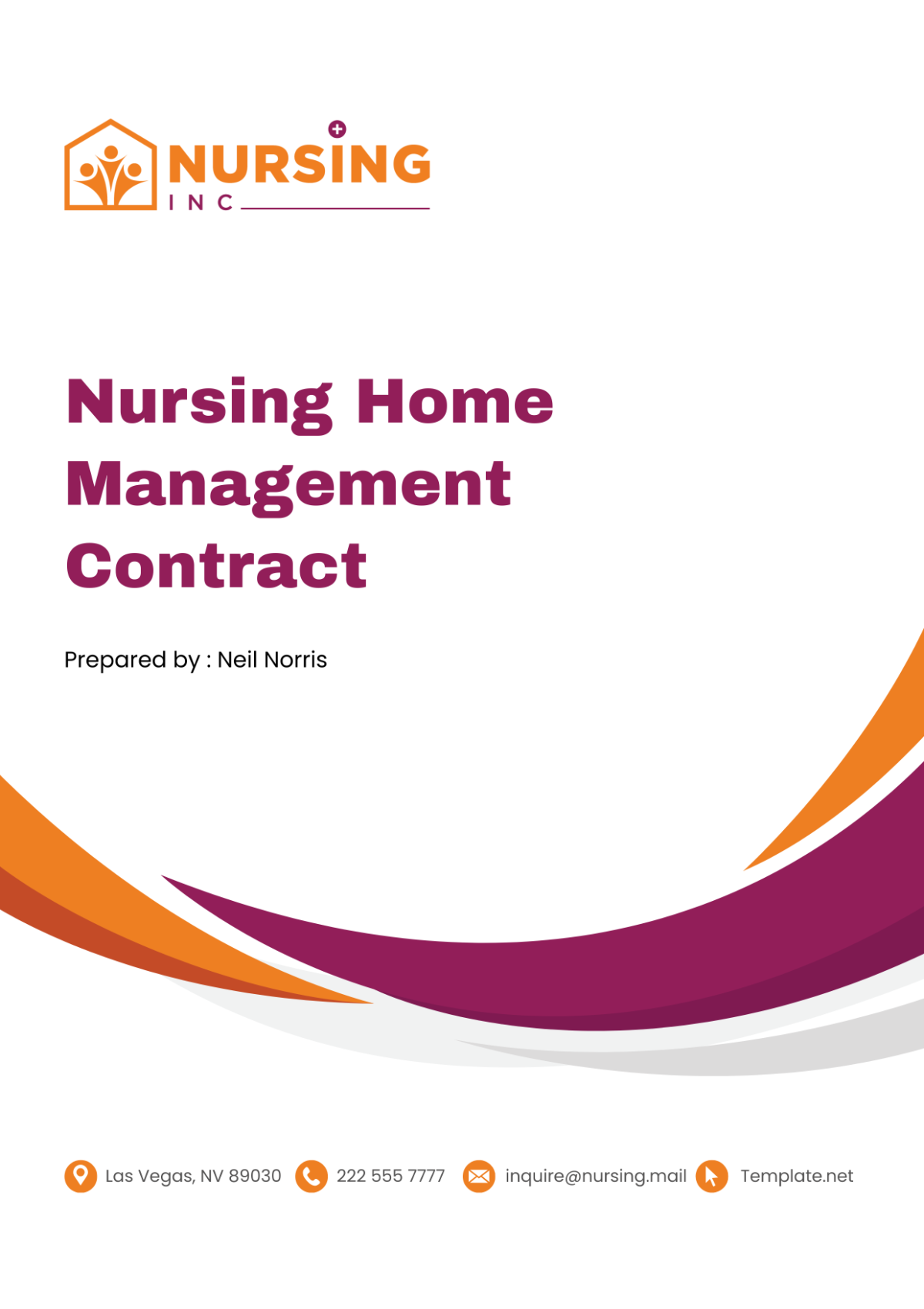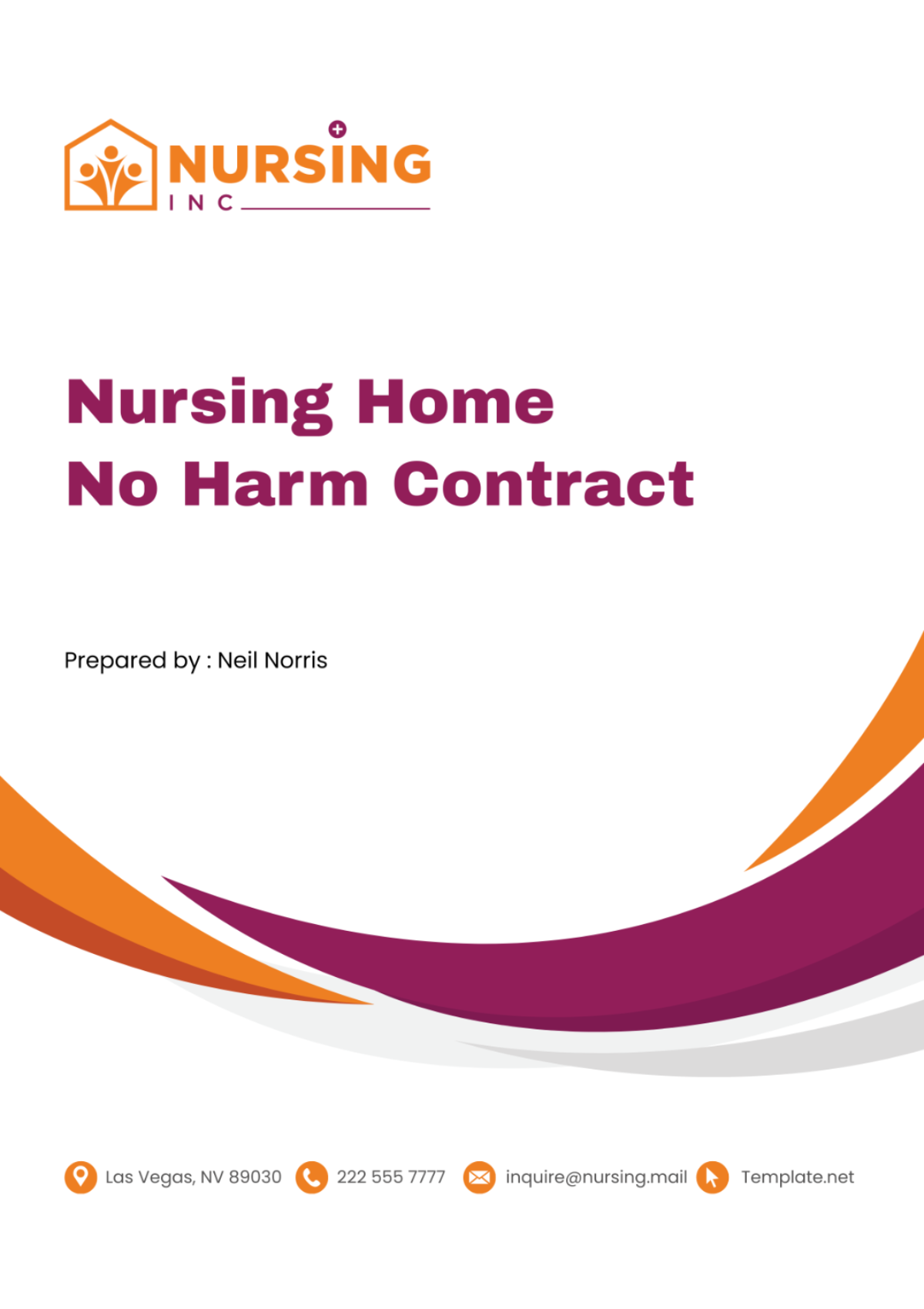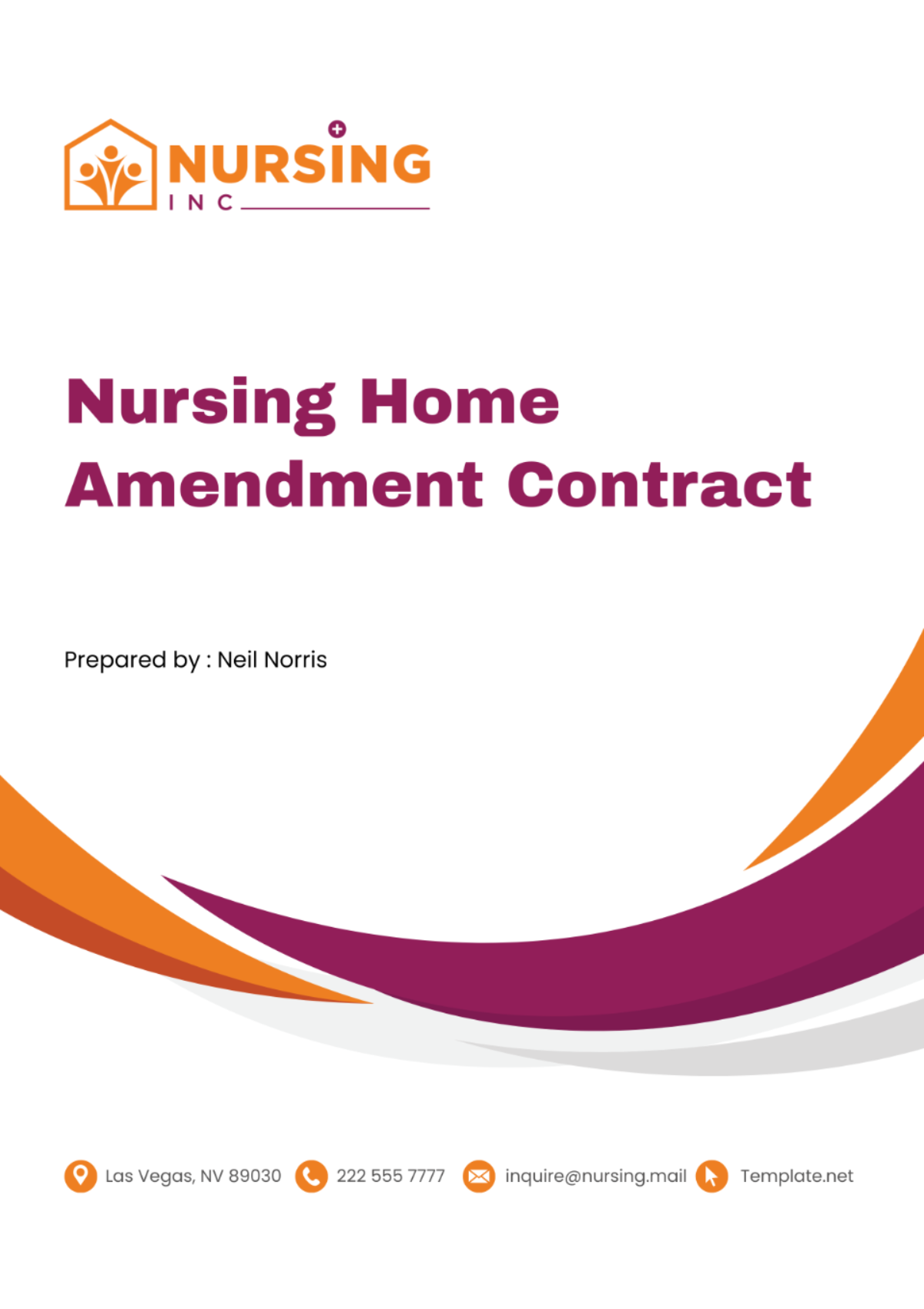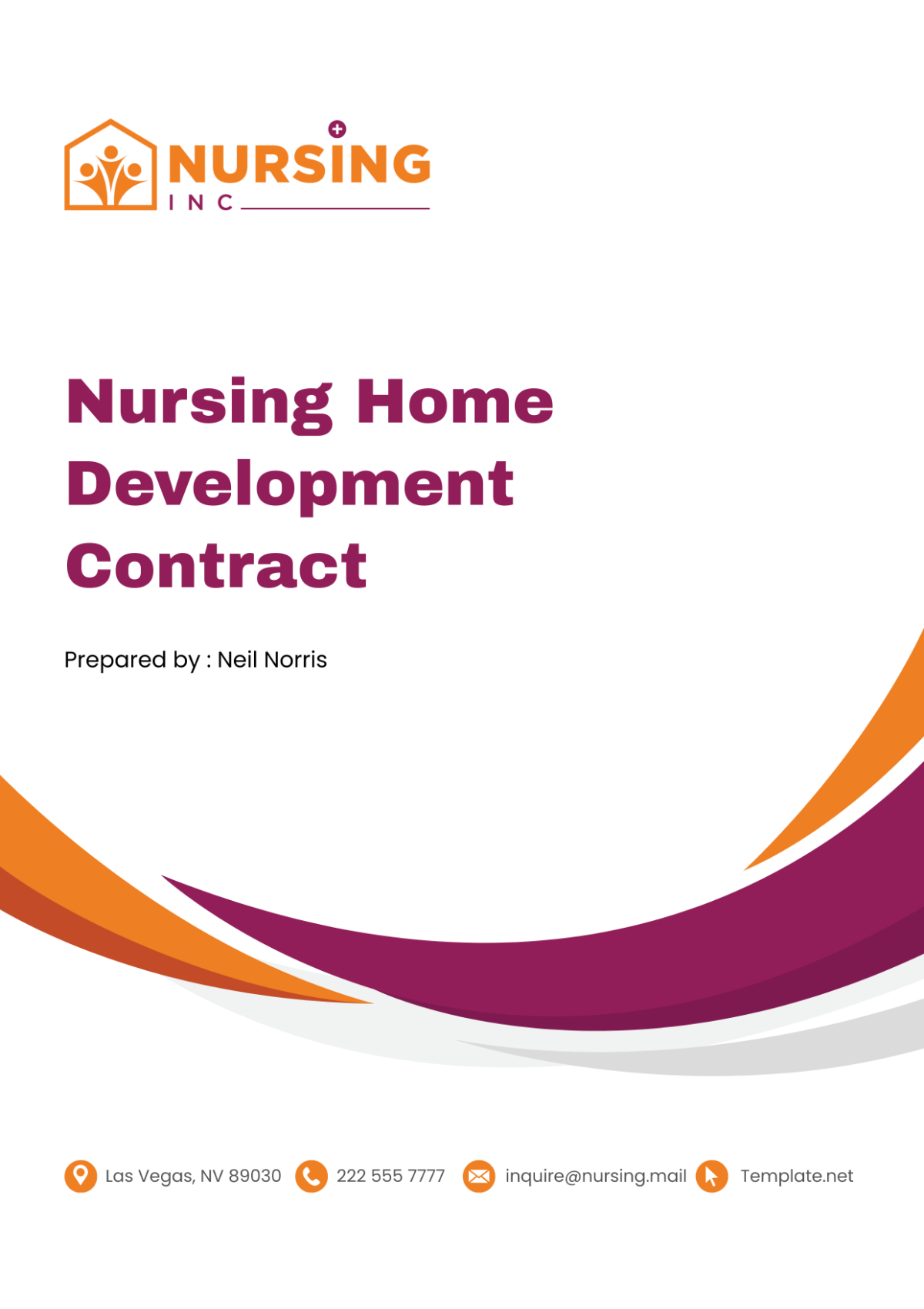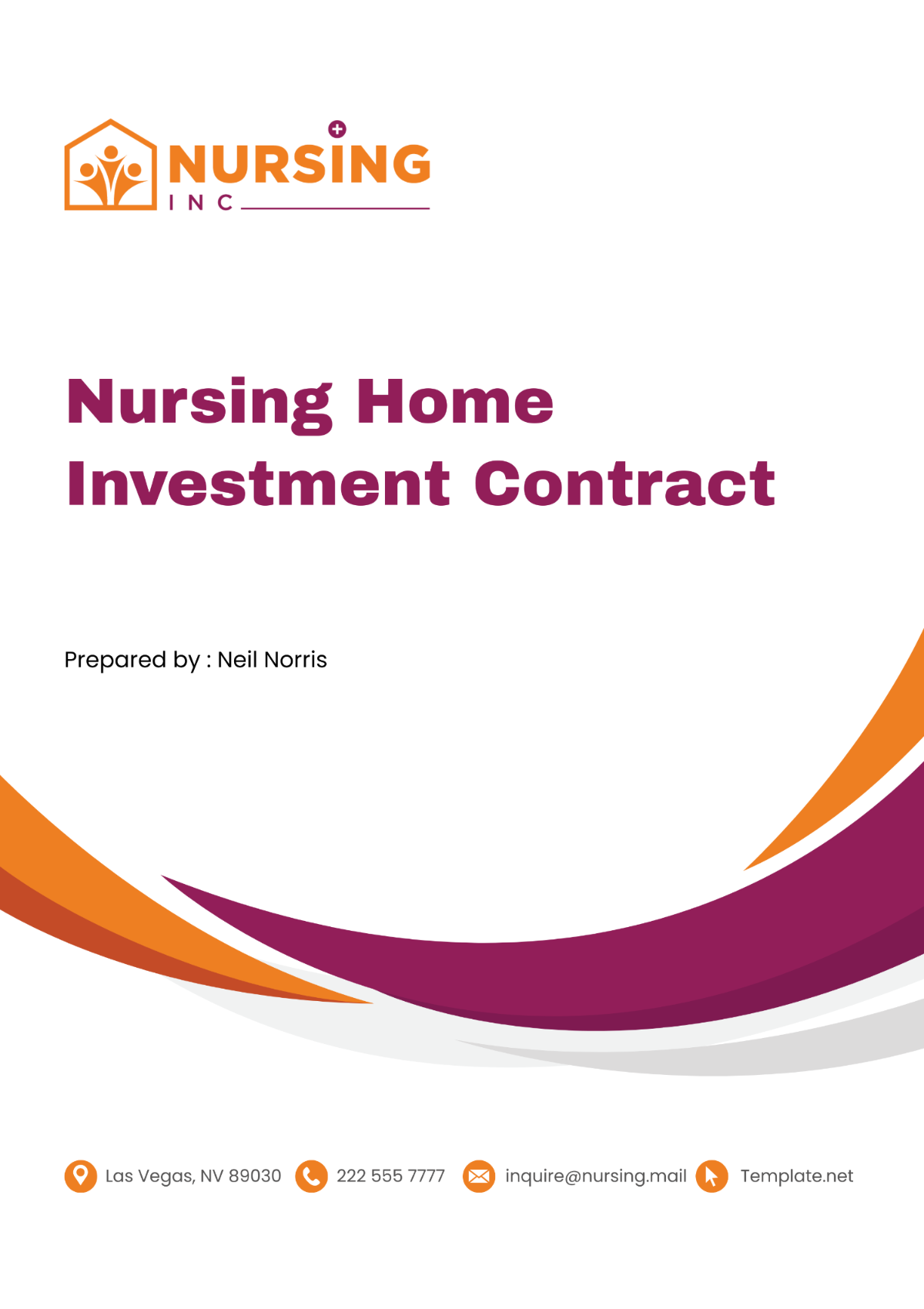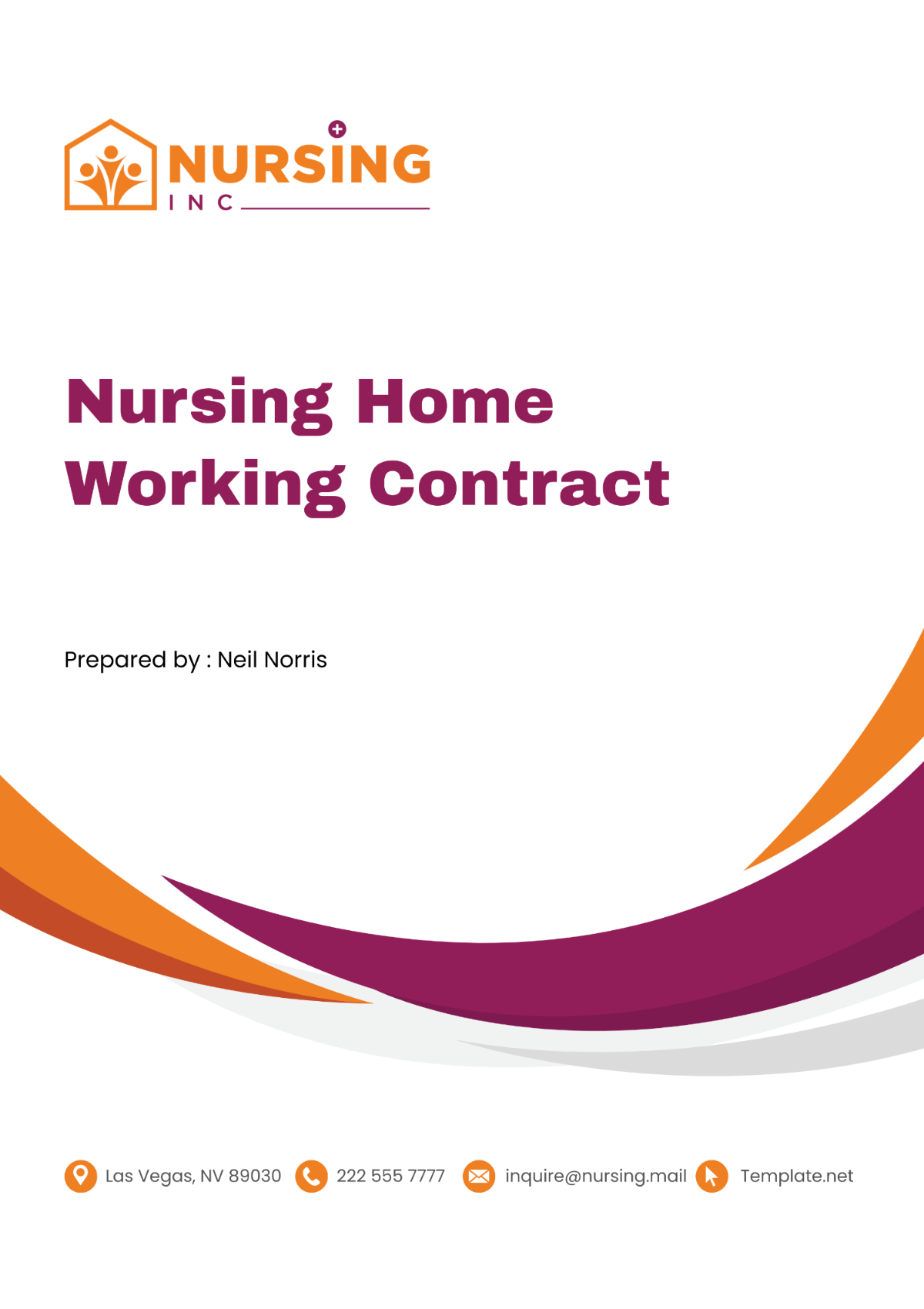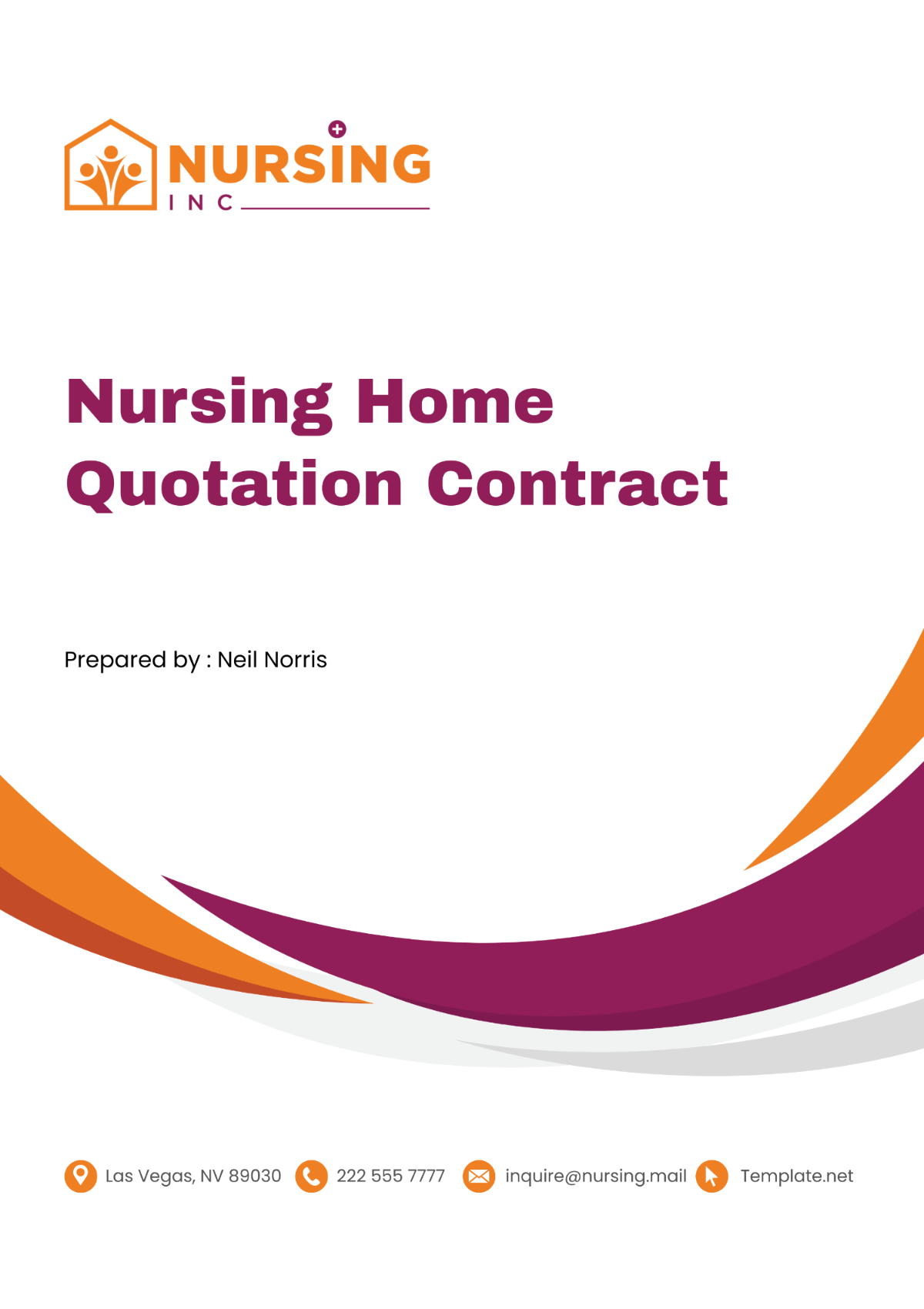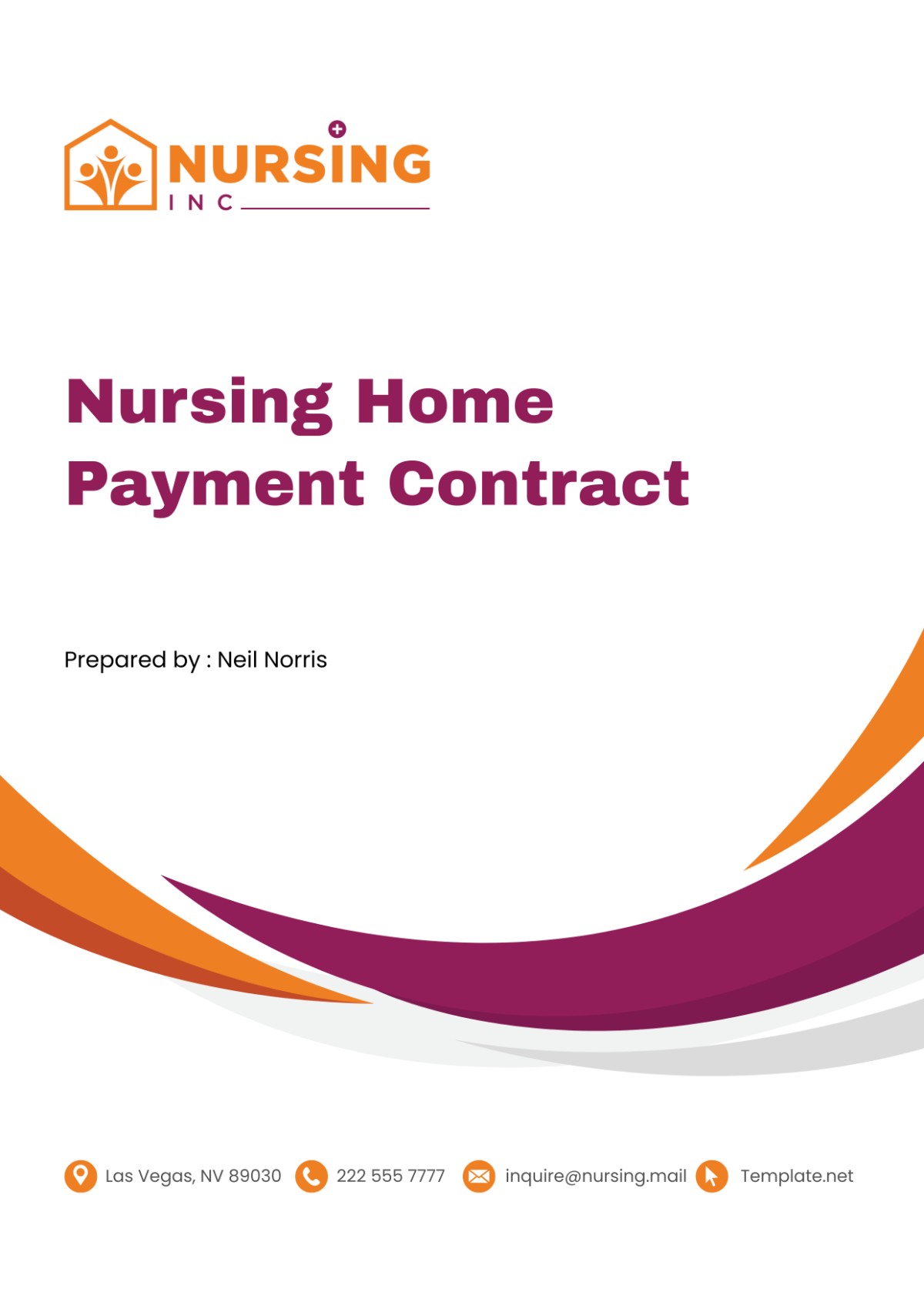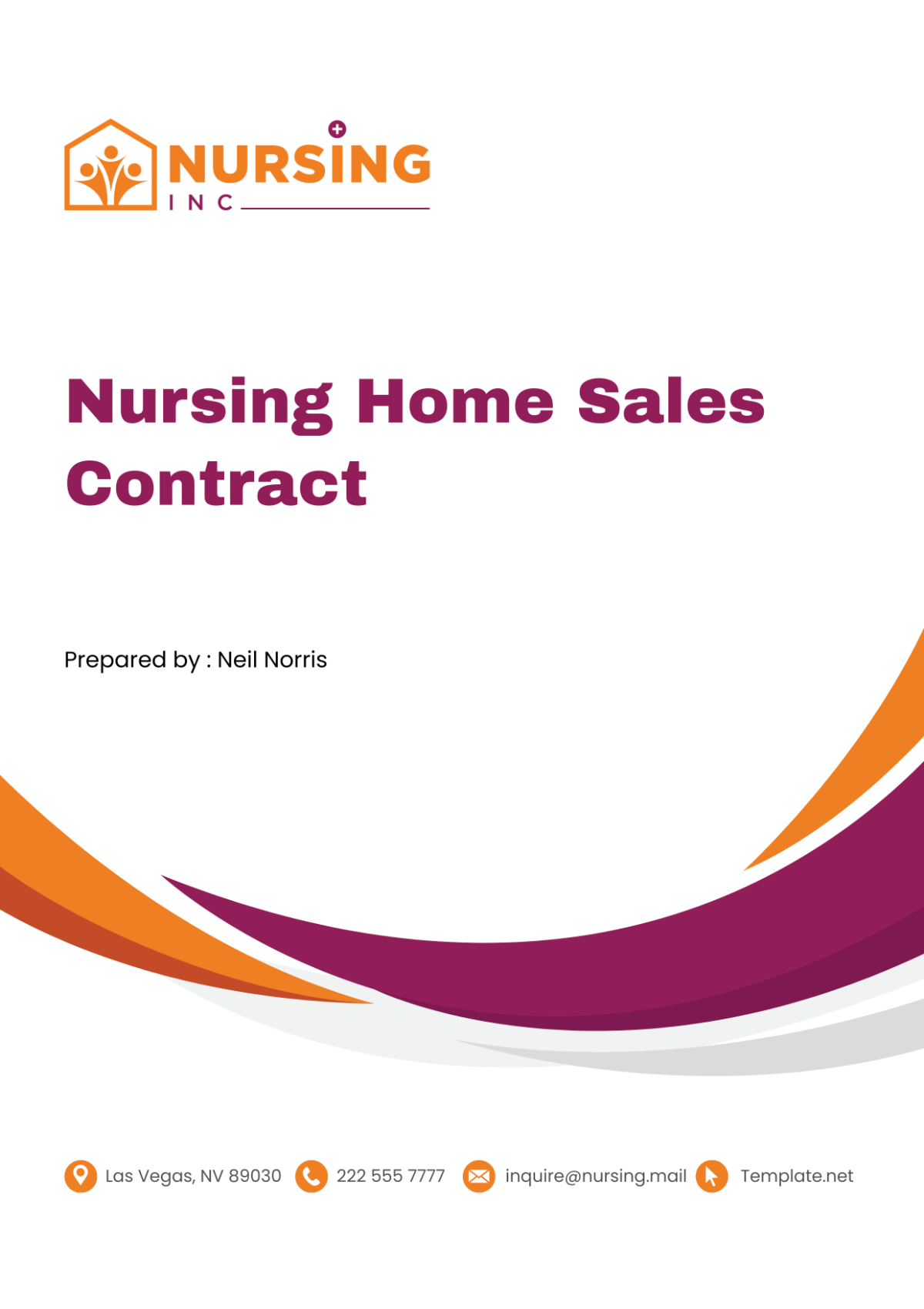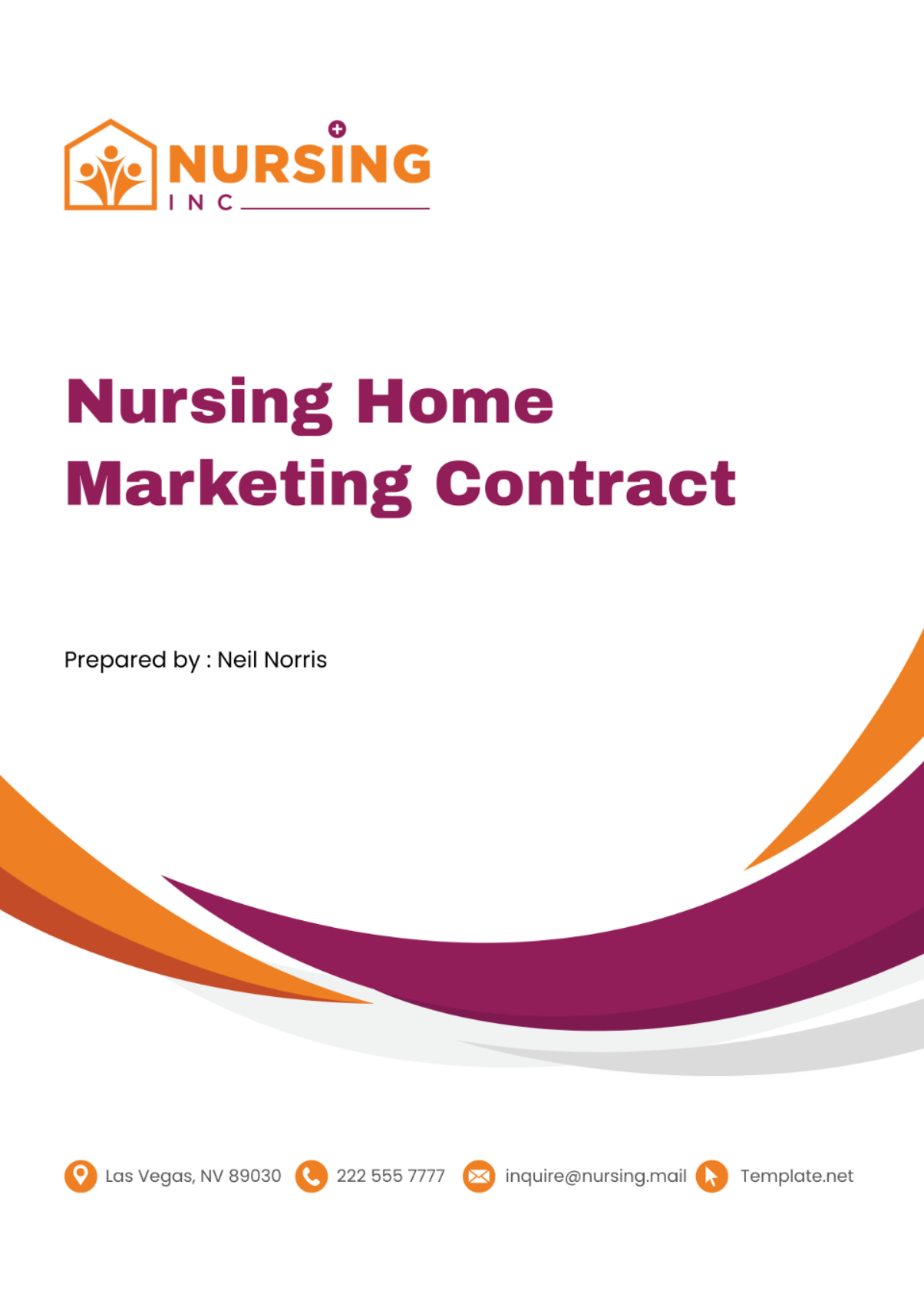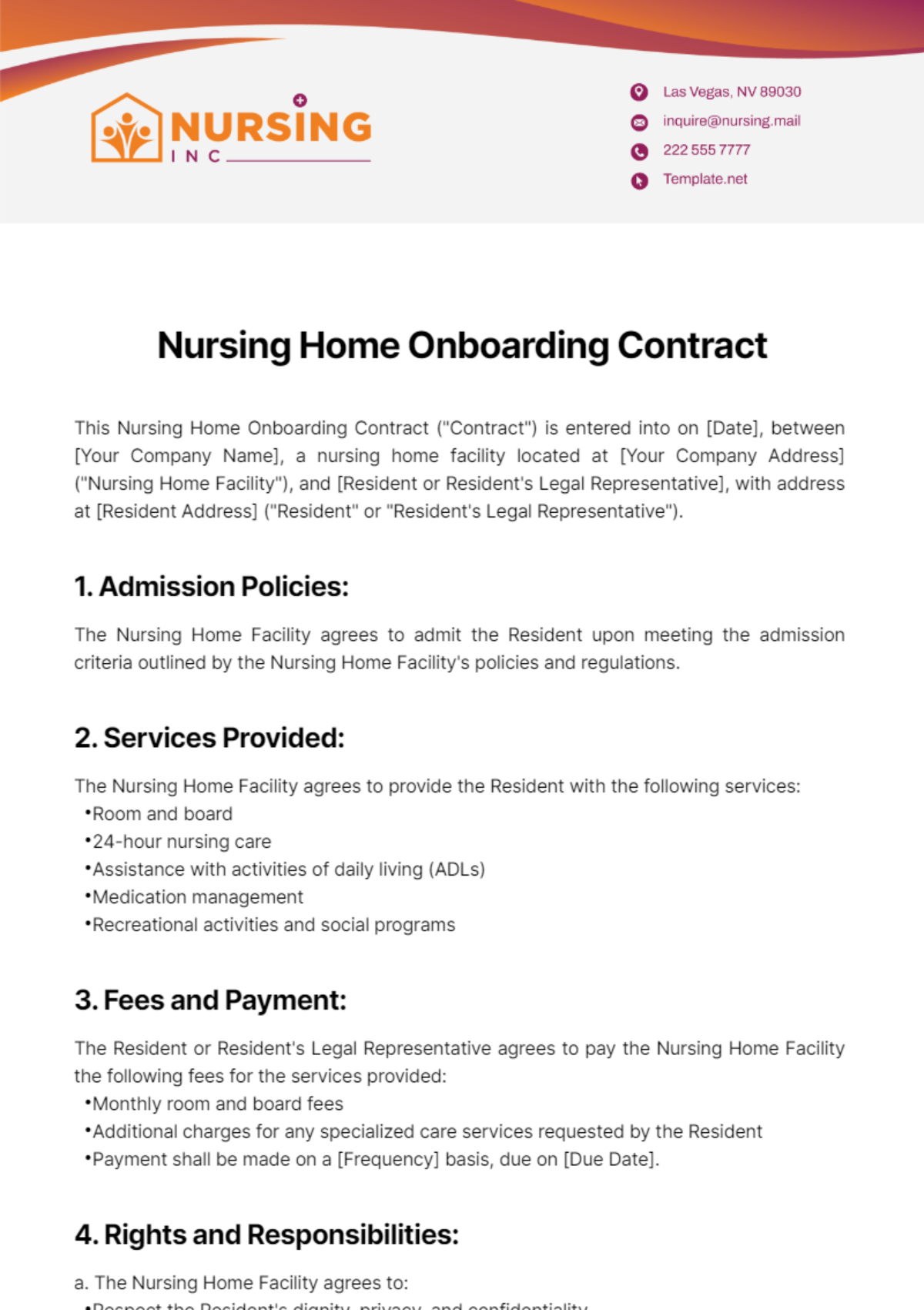Free Nursing Home Performance Contract Template
Nursing Home Performance Contract
I. The Parties
This Nursing Home Performance Contract (the "Contract") is entered into as of [Month Day, Year] by and between [Your Company Name], with a registered address at [Your Company Address], herein referred to as (the "Nursing Home") and [Contractor's Name], with registered address at [Contractor's Address], herein referred to as (the "Contractor") collectively called (the "Parties").
WHEREAS, the Nursing Home is engaged in the provision of comprehensive healthcare and assisted living services for the elderly and is in need of certain services that the Contractor is qualified and willing to provide;
WHEREAS, the Contractor has significant experience and expertise in providing the services required by the Nursing Home and is willing to provide such services on the terms and conditions set forth in this contract;
WHEREAS, the Parties, acting through their duly authorized representatives, have discussed and agreed upon the terms and conditions of the Contractor’s engagement by the Nursing Home and wish to set forth their agreement in this contract;
NOW, THEREFORE, in consideration of the mutual covenants contained herein and for other good and valuable consideration, the receipt and sufficiency of which is hereby acknowledged, the Parties agree as follows:
II. Purpose of the Contract
A. Establishment of Terms and Conditions
Contractual Agreement: The purpose of this contract is to establish a formal agreement between the Parties, outlining the terms and conditions under which the Contractor will provide services to the Nursing Home. This provides a clear framework for the relationship between the Parties and sets expectations for both sides.
Service Provision: The Contractor agrees to provide the services as specified in this contract. These services are essential to the operation of the Nursing Home and are expected to be delivered in a timely, efficient, and professional manner.
Contract Compliance: Both Parties are expected to comply with all terms and conditions outlined in this contract. Failure to do so may result in penalties or termination of the contract.
B. Quality of Services
Professional Standards: The services provided by the Contractor shall be rendered following the highest professional standards applicable to the Nursing Home industry. This ensures that the Nursing Home receives top-quality services that contribute to the well-being of its residents and the smooth operation of its facilities.
Performance Evaluation: The Contractor’s performance will be regularly evaluated against these standards. This helps ensure that the Contractor is meeting the Nursing Home’s expectations and provides an opportunity for feedback and improvement.
Continuous Improvement: The Contractor is expected to strive for continuous improvement in the delivery of services. This includes staying updated on industry best practices, implementing innovative solutions, and responding effectively to feedback.
C. Impact on the Nursing Home
Operational Efficiency: By providing high-quality services, the Contractor contributes to the operational efficiency of the Nursing Home. This helps the Nursing Home provide excellent care to its residents and meet its operational goals.
Resident Satisfaction: The services provided by the Contractor directly impact the satisfaction of the Nursing Home’s residents. High-quality services enhance the residents’ quality of life and contribute to their overall satisfaction with the Nursing Home.
Reputation: The quality of the Contractor’s services also impacts the Nursing Home’s reputation. By adhering to the highest professional standards, the Contractor helps the Nursing Home maintain a positive reputation in the community and the industry.
III. Scope of Services
A. Commissioned Services
Service Provision: The Contractor has been commissioned to carry out a variety of services for the Nursing Home. These services are integral to the operation of the Nursing Home and are expected to be delivered with the highest level of professionalism and care.
Service Details: The Contractor will provide a range of services that may include, but are not limited to, nursing care, physical therapy, mental health support, meal preparation, housekeeping, and administrative support.
2.1. Nursing Care: This involves providing direct care to residents, including administering medications, monitoring vital signs, and assisting with daily activities such as bathing and eating. The Contractor’s team should consist of licensed and experienced nurses who are capable of providing this care.
2.2. Physical Therapy: The Contractor may be required to provide or arrange for physical therapy services for residents. This could include exercises to improve strength and mobility, pain management techniques, and rehabilitation services. The Contractor should have access to qualified physical therapists for this purpose.
2.3. Mental Health Support: Given the importance of mental health in overall well-being, the Contractor may also be required to provide mental health support to residents. This could involve arranging for counselling sessions, providing therapeutic activities, and ensuring a supportive and positive environment.
2.4. Meal Preparation: This involves planning and preparing meals for residents, taking into account dietary restrictions and preferences. The Contractor may also be responsible for ensuring that meals are served in a timely and orderly manner. The Contractor should employ experienced cooks and dietitians for this purpose.
2.5. Housekeeping: The Contractor may be responsible for maintaining a clean and safe environment for residents. This could include cleaning resident rooms, common areas, and laundry services. The Contractor should have a dedicated housekeeping team to ensure a high standard of cleanliness.
2.6. Administrative Support: The Contractor may also provide administrative support services, such as managing resident records, scheduling appointments, and coordinating with other healthcare providers. The Contractor should have trained administrative staff who are familiar with healthcare administration.
Service Standards: All services provided by the Contractor must meet or exceed the standards set forth in this Agreement, as well as any applicable industry standards. This ensures that the residents of the Nursing Home receive the highest quality of care.
3.1. Quality Assurance: The Contractor will implement quality assurance measures to monitor and improve the quality of services. This could include regular audits, feedback surveys, and continuous improvement initiatives. The Contractor should have a quality assurance team or officer to oversee these activities.
3.2. Regulatory Compliance: The Contractor will ensure that all services comply with applicable laws and regulations. This includes health and safety regulations, privacy laws, and industry-specific regulations. The Contractor should have a compliance officer or team to ensure adherence to these regulations.
3.3. Customer Service: The Contractor should strive to provide excellent customer service to the residents and their families. This includes addressing any concerns or complaints promptly and professionally, and continuously seeking feedback to improve service delivery.
B. Safety Standards
Compliance: The Contractor shall comply with all reasonable standards of safety in the execution of the services. This includes following all relevant health and safety regulations, using appropriate personal protective equipment, and taking necessary precautions to prevent accidents and injuries.
1.1. Training: The Contractor will ensure that all personnel involved in providing the services are properly trained in safety procedures. This includes regular safety training sessions and immediate training for new hires or when new safety procedures are implemented.
1.2. Reporting: The Contractor will promptly report any safety incidents to the Nursing Home. This includes any accidents, injuries, or near misses that occur while providing the services.
Risk Management: The Contractor will implement a risk management plan to identify potential hazards, assess risks, and develop strategies to manage those risks. This is crucial for preventing accidents and ensuring the safety of both the Contractor’s personnel and the Nursing Home’s residents.
2.1. Hazard Identification: The Contractor will regularly inspect the work environment and the services provided to identify potential hazards. This could include physical hazards, chemical hazards, biological hazards, and ergonomic hazards.
2.2. Risk Assessment: The Contractor will assess the risks associated with identified hazards. This involves determining the likelihood of an incident occurring and the potential impact if it does occur.
Emergency Preparedness: The Contractor will develop and implement an emergency preparedness plan. This plan should outline the procedures to be followed in the event of an emergency, such as a fire, power outage, or medical emergency.
3.1. Emergency Procedures: The Contractor will develop procedures for responding to various types of emergencies. These procedures should be clearly documented and communicated to all personnel.
3.2. Training and Drills: The Contractor will provide training on emergency procedures to all personnel and conduct regular drills to ensure that everyone knows what to do in an emergency.
C. Professional Standards
Experienced Professionals: The Contractor will execute all expressed provisions of this Agreement using experienced and trained professionals who hold skill levels appropriate to their tasks. This ensures that the services are provided by individuals who have the necessary knowledge and skills.
1.1. Qualifications: The Contractor will ensure that all personnel have the necessary qualifications for their roles. This could include relevant degrees, certifications, and licenses.
1.2. Experience: The Contractor will ensure that all personnel have relevant experience in their roles. This includes experience in the nursing home industry and experience with the specific services to be provided.
Ongoing Training: The Contractor will provide ongoing training to its professionals to ensure they stay updated on the latest best practices and regulations in the Nursing Home industry. This helps maintain a high standard of service and ensures compliance with all relevant regulations.
2.1. Continuing Education: The Contractor will provide opportunities for continuing education to its professionals. This could include workshops, seminars, and online courses.
2.2. Performance Reviews: The Contractor will conduct regular performance reviews to assess the performance of its professionals and identify areas for improvement.
Performance Evaluation: The Contractor’s performance, including the performance of its individual professionals, will be regularly evaluated against the standards set forth in this Agreement. This helps ensure accountability and continuous improvement in the provision of services.
3.1. Evaluation Criteria: The Contractor will develop criteria for evaluating the performance of its professionals. These criteria should be based on the requirements of their roles and the standards set forth in this Agreement.
3.2. Feedback: The Contractor will provide feedback to its professionals based on their performance evaluations. This feedback should be constructive and should include recommendations for improvement.
D. Performance Monitoring
Regular Reviews: The Contractor’s performance will be reviewed on a regular basis to ensure that the services provided meet the standards set forth in this Agreement. These reviews will be based on feedback from the Nursing Home’s staff, residents, and their families, as well as any relevant performance metrics.
1.1. Feedback Collection: The Contractor will establish mechanisms for collecting feedback from the Nursing Home’s staff, residents, and their families. This could include surveys, suggestion boxes, and regular meetings.
1.2. Performance Metrics: The Contractor will track performance metrics related to the services provided. This could include measures of service quality, resident satisfaction, and compliance with regulations.
Improvement Plans: If the Contractor’s performance does not meet the standards set forth in this Agreement, the Contractor will be required to develop and implement a plan to improve performance. This plan should address the areas of concern and outline specific actions to be taken.
2.1. Plan Development: The Contractor will work with the Nursing Home to develop a performance improvement plan. This plan should be based on the results of the performance review and should address all areas of concern.
2.2. Plan Implementation: The Contractor will be responsible for implementing the performance improvement plan. This includes taking the actions outlined in the plan, monitoring progress, and adjusting the plan as needed.
Performance Incentives: The Contractor may be eligible for performance incentives if the services provided exceed the standards set forth in this Agreement. These incentives are designed to reward exceptional performance and encourage continuous improvement.
3.1. Incentive Criteria: The criteria for performance incentives will be defined in the Agreement. This could include measures of service quality, resident satisfaction, and innovation.
3.2. Incentive Awards: The Contractor will receive the performance incentives in the form of additional compensation, recognition, or other benefits as defined in the Agreement.
IV. Compensation
A. Fixed Fee
Payment Amount: The Nursing Home shall pay the Contractor a fixed fee of [$10,000]. This fee has been agreed upon by both Parties and reflects the value of the services to be provided by the Contractor.
Payment Schedule: The fixed fee shall be paid on the [15th] day of each month. This regular payment schedule ensures that the Contractor receives timely compensation for their services.
Payment Method: The payment will be made via a method agreed upon by both Parties, such as bank transfer or check. This method should be secure, reliable, and convenient for both Parties.
B. Additional Costs
Responsibility: Any additional costs or expenses not stated in this contract shall be the sole responsibility of the Contractor. This includes costs related to materials, equipment, travel, and personnel.
Disclosure: The Contractor is expected to disclose any potential additional costs to the Nursing Home in advance. This allows the Nursing Home to plan its budget and avoid any unexpected expenses.
Approval: Any additional costs that exceed a certain threshold, as specified in the contract, must be approved by the Nursing Home in advance. This ensures that the Nursing Home has control over its budget and can make informed decisions about additional expenditures.
C. Invoicing and Records
Invoicing: The Contractor will provide the Nursing Home with an invoice for each payment. The invoice should clearly state the date, the amount due, and a description of the services provided.
Records: The Contractor will keep accurate and detailed records of all services provided and expenses incurred under this contract. These records may be audited by the Nursing Home at any time.
Payment Disputes: If there is a dispute about a payment, the Parties will refer to the contract and the Contractor’s records to resolve the dispute. If the dispute cannot be resolved, the Parties may seek mediation or legal action.
V. Confidentiality
A. Confidentiality Obligation
Confidential Information: Both Parties agree to keep any and all information received from the other Party in connection with this contract confidential. This includes, but is not limited to, business strategies, financial information, patient data, proprietary methodologies, and any other information that could be considered sensitive or proprietary.
1.1. Protection of Information: Both Parties are obligated to take reasonable measures to protect the confidentiality of the information. This could include storing the information securely, limiting access to the information, and implementing data security measures.
1.2. Non-Disclosure: Both Parties agree not to disclose the confidential information to any third party, except as allowed under this contract or required by law. This includes not sharing the information with friends, family, or business associates.
Exceptions: The confidentiality obligation does not apply to information that is publicly available, independently developed by the receiving Party, or rightfully received from a third party not under a confidentiality obligation.
2.1. Publicly Available Information: If the information is publicly available, it is not considered confidential. However, the receiving Party must not be the one who made the information public.
2.2. Independently Developed Information: If the receiving Party independently develops the same information without using the confidential information, the independently developed information is not considered confidential.
Legal Requirements: If a Party is required by law to disclose the confidential information, they may do so. However, they should notify the other Party in advance and cooperate with any efforts to contest or limit the disclosure.
3.1. Legal Notice: If a Party receives a legal notice requiring the disclosure of confidential information, they should promptly notify the other Party. This gives the other Party the opportunity to contest the disclosure or seek a protective order.
3.2. Limited Disclosure: If disclosure is required by law, the Party should disclose only the specific information required and nothing more. They should also seek to ensure that the disclosed information is treated confidentially by the recipient.
B. Confidentiality Breach
Identification: If a Party believes that there has been a breach of the confidentiality obligations in this Agreement, they should promptly notify the other Party. This allows the Parties to quickly address the issue and mitigate any potential damage.
1.1. Investigation: Upon receiving a notification of a potential breach, the Parties will cooperate to investigate the matter. This may involve reviewing access logs, interviewing personnel, or engaging third-party investigators.
1.2. Mitigation: The Parties will take appropriate steps to mitigate the impact of the breach. This could include retrieving the disclosed information, notifying affected individuals, or changing security protocols.
Consequences: If a Party breaches the confidentiality obligations, they may be subject to consequences as outlined in this Agreement. This could include termination of the Agreement, legal action, or financial penalties.
2.1. Termination: If the breach is serious, the non-breaching Party may have the right to terminate the Agreement. This would end the contractual relationship and the breaching Party would no longer provide services to the Nursing Home.
2.2. Legal Action: The non-breaching Party may also have the right to take legal action against the breaching Party. This could involve suing for breach of contract, seeking an injunction to prevent further breaches, or claiming damages for any harm caused by the breach.
Resolution: The Parties will work together to resolve any issues related to a breach of confidentiality. This could involve negotiating a resolution, participating in mediation, or going to court.
3.1. Negotiation: The Parties may try to negotiate a resolution to the breach. This could involve the breaching Party agreeing to take certain actions to remedy the breach or prevent future breaches.
3.2. Mediation: If the Parties cannot reach a resolution through negotiation, they may agree to participate in mediation. This involves a neutral third party helping the Parties to reach a mutually acceptable resolution.
3.3. Court Proceedings: If the Parties cannot resolve the breach through negotiation or mediation, they may need to go to court. The court would then decide the outcome based on the evidence presented and the terms of the Agreement.
VI. Termination
A. Termination Notice
Notice Requirement: This contract may be terminated by either party upon giving a written notice of [15] days to the other party. This notice period allows both parties to make necessary arrangements and transitions related to the termination of the contract.
1.1. Delivery of Notice: The termination notice should be delivered in accordance with the notice provisions of the contract. This could include delivery by mail, email, or personal delivery.
1.2. Content of Notice: The termination notice should clearly state the intention to terminate the contract, the effective date of termination, and the reason for termination, if applicable.
Immediate Termination: In certain circumstances, such as a breach of contract or illegal activity, a party may have the right to terminate the contract immediately without providing [15] days’ notice. The specific circumstances allowing for immediate termination should be outlined in the contract.
2.1. Breach of Contract: If a party breaches any term of the contract, the other party may have the right to terminate the contract immediately. This ensures that both parties are held accountable for their obligations under the contract.
2.2. Illegal Activity: If a party engages in illegal activity related to the contract, the other party may have the right to terminate the contract immediately. This protects both parties from legal liability and ensures the integrity of their operations.
B. Obligations Upon Termination
Payment for Services: Upon termination, the Nursing Home shall be obliged to pay for all services rendered by the Contractor up until the termination date. This ensures that the Contractor is fairly compensated for their work.
1.1. Final Invoice: The Contractor will provide a final invoice detailing the services provided and the amount due. The Nursing Home should pay this invoice in accordance with the payment terms of the contract.
1.2. Disputes: If there is a dispute about the final payment, the parties will refer to the contract and the Contractor’s records to resolve the dispute. If the dispute cannot be resolved, the parties may seek mediation or legal action.
Return of Property: Upon termination, the Contractor should return any property of the Nursing Home in their possession. This could include keys, equipment, documents, and confidential information.
2.1. Inventory: The Contractor should take an inventory of all Nursing Home property in their possession and arrange for its return.
2.2. Confidential Information: The Contractor should also ensure that all confidential information is either returned to the Nursing Home or properly destroyed, in accordance with the confidentiality provisions of the contract.
Survival of Terms: Certain terms of the contract will survive its termination. These could include confidentiality, dispute resolution, and any other terms that by their nature should survive termination.
3.1. Confidentiality: The Contractor’s obligation to maintain the confidentiality of the Nursing Home’s information will continue even after the termination of the contract.
3.2. Dispute Resolution: Any disputes that arise out of the termination of the contract will be resolved in accordance with the dispute resolution provisions of the contract.
VII. Dispute Resolution
A. Good Faith Effort
Should any discrepancies or disputes arise in relation to the interpretation, performance, or receipt of this Contract, the parties will make a good faith effort to solve such issues through mutual dialogue. This involves open and honest communication, a willingness to understand the other party’s perspective, and a commitment to finding a mutually acceptable solution.
Interpretation Discrepancies: Discrepancies related to the interpretation of the contract involve differing understandings of what the contract terms mean. The parties will discuss their interpretations and try to reach a common understanding.
Performance Disputes: Disputes related to the performance of the contract involve disagreements about how the services are being provided or whether the parties are fulfilling their obligations. The parties will review the contract terms, discuss the issue, and determine how to improve performance.
B. Mediation
If the Parties are unable to resolve a dispute through mutual dialogue, they may agree to engage in mediation. Mediation is a voluntary process where a neutral third party, known as a mediator, helps the Parties communicate and negotiate with each other to reach a mutually acceptable resolution.
Selection of Mediator: The Parties will mutually agree on the selection of the mediator. The mediator should be someone who is impartial and has experience in dispute resolution in the nursing home industry.
Mediation Process: The Parties will participate in the mediation process in good faith, which includes attending mediation sessions, openly discussing the dispute, and considering proposed solutions.
C. Arbitration
If mediation does not resolve the dispute, the Parties may agree to arbitrate the dispute. Arbitration is a process where a neutral third party, known as an arbitrator, hears the arguments from both Parties and makes a decision that is usually binding.
Selection of Arbitrator: The Parties will mutually agree on the selection of the arbitrator. The arbitrator should be someone who is impartial and has experience in dispute resolution in the nursing home industry.
Arbitration Process: The Parties will participate in the arbitration process in good faith, which includes presenting their arguments and evidence to the arbitrator and abiding by the arbitrator’s decision.
VIII. Governing Law
A. Applicable Law
State Law: This contract shall be governed by and construed in accordance with the laws of [State Name]. This means that the laws of [State Name] will be used to interpret the contract and resolve any disputes or issues that arise under the contract.
1.1. Contract Law: The contract will be governed by the contract law of [State Name]. This includes laws related to the formation, interpretation, performance, and breach of contracts.
1.2. Industry Regulations: The contract will also be governed by any state regulations that apply to the nursing home industry. This includes laws related to healthcare, employment, and privacy.
Federal Law: In addition to state law, certain aspects of the contract may also be governed by federal law. This includes laws related to healthcare privacy, labor standards, and discrimination. The parties must comply with all applicable federal laws.
2.1. Healthcare Privacy: The parties must comply with federal laws related to healthcare privacy, such as the Health Insurance Portability and Accountability Act (HIPAA).
2.2. Labor Standards: The parties must comply with federal labor laws, such as the Fair Labor Standards Act (FLSA), which sets standards for minimum wage, overtime pay, and child labor.
Conflict of Laws: If there is a conflict between state law and federal law, or between the laws of different states, the conflict will be resolved in accordance with the principles of conflict of laws. This typically involves determining which law has the most significant relationship to the issue at hand.
3.1. Choice of Law: The contract includes a choice of law clause, which specifies that the laws of [State Name] will govern the contract. This clause is generally enforced by the courts, unless it contradicts public policy.
3.2. Public Policy: If enforcing the laws of [State Name] would contradict the public policy of another state, the courts may choose to apply the laws of the other state. This is a complex area of law and is determined on a case-by-case basis.
B. Jurisdiction and Venue
Jurisdiction: The courts of [State Name] will have jurisdiction over any disputes or legal proceedings that arise out of this contract. This means that any legal action related to this contract must be filed in [State Name].
1.1. Consent to Jurisdiction: By entering into this contract, both Parties consent to the jurisdiction of the courts of [State Name]. This means that they agree to bring any legal actions related to this contract in these courts and to abide by the decisions of these courts.
1.2. Federal and State Courts: The jurisdiction of the courts of [State Name] includes both federal and state courts. This means that a legal action could be brought in either a federal or a state court, depending on the nature of the dispute.
Venue: The venue for any legal action will be the county where the Nursing Home is located. This provides a convenient and appropriate location for resolving disputes.
2.1. Consent to Venue: By entering into this contract, both Parties consent to the venue of the courts in the county where the Nursing Home is located. This means that they agree to bring any legal actions related to this contract in these courts.
2.2. Change of Venue: If for some reason the agreed-upon venue is not available or appropriate, the Parties may agree to change the venue. However, any change of venue must be agreed upon by both Parties and approved by the court.
IX. Signatures
By signing below, the parties hereby confirm their understanding and acceptance of the contractual obligations stated above.
Nursing Home

[Authorized Representative Name]
[Your Company Name]
Date: [Month Day, Year]
Contractor

[Contractor's Name]
Date: [Month Day, Year]
